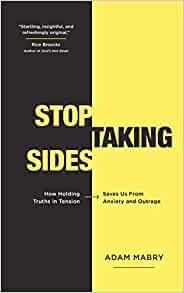The author is an American who is the Lead Pastor of a Church in Boston, Mass, but who has also lived and engaged in Christian work in the UK, including in Edinburgh. So his work is accessible to us on this side of the Atlantic!
The title of the book sounds as if it may be advocating some sort of washy-washy, anything-goes-ism. But do not be deceived! This is NOT what Mabry is espousing.
He is deeply rooted in and committed to the Scriptures, and from his reading of the Scriptures he argues firstly, that there ARE certain core things which are non-negotiable for followers of Christ. These are the things on which we can and must take just one side: that God is God; that God is the creator of the universe and us; that Jesus is Lord and Saviour; and that we are saved by faith and not by works.
But on this basis, Mabry goes on to suggest that there are numerous other matters on which Christians have often come down on one side or the other, where the reality is that both sides are true and have to be held in tension with each other. He argues - cogently to my mind - that on these matters the Scriptures themselves present both sides as true, at one and the same time, and so we must treat them so, too.
The issues he discusses are:
- Divine sovereignty and human responsibility
- Humanity bearing the image of God and deeply flawed by sin
- Word and Spirit and Tradition
- Us and Them
- Victory and Suffering
- Love and Wrath
- Earthly Politics and the Kingdom of God
- Strong and Weak
- I and We
For each pairing, Mabry provides Scriptural evidence for each ‘side,’ and for the need to hold each ‘side’ in tension with the other. ‘Tension’ is NOT the same as ‘balance’! Rather than choosing 'either/or', tension involves living them both together as being both true at the same time, hard though that they may be. Mabry also suggests a Christian virtue that arises out of us seeking to hold each pair of ‘opposite’ truths in true tension. These virtues are (respectively): Humility; Prudence; Diligence; Kindness; Steadfast Faith; Charity; Justice; Meekness; and Love.
Mabry acknowledges that almost all of us tend to gravitate more towards one of each of these pairings than the other, and that holding them in tension is hugely difficult. But, he argues (rightly, I think) that if we are to be true followers of Christ we must do so.
The book is very readable, with plenty of good examples (often from Mabry’s own life) and worthwhile, even though it was clearly completed and in press before the Coronavirus and the lockdown changed much of life as we know it.
This book is available to purchase from The Good Book Company.
Chris Knights, Lordshill Church of England, Southampton

